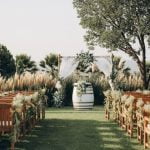What are wedding vows? Wedding vows are a crucial part of any marriage ceremony, as they symbolize the promises and commitments made between two individuals embarking on a lifelong journey together. In this article, we will explore the significance of wedding vows in a marriage ceremony, their history, traditional and non-traditional examples from different cultures and religions, tips for writing personalized vows, the deeper meaning behind them, and ways to include family customs and cultural traditions.
Wedding vows date back centuries and have played a significant role in wedding ceremonies across different cultures and societies. Understanding the origins of wedding vows provides insight into their evolution over time, reflecting changing societal norms and values.
As couples seek to personalize their wedding experiences, the trend of writing one’s own vows has become increasingly popular. This article seeks to provide guidance for couples who wish to craft unique expressions of love and commitment that resonate with their personal values and beliefs.
In addition to exploring traditional wedding vow examples from different cultures and religions, this article also delves into alternative options for couples who want to stray from conventional vows. From secular to spiritual or even humorous expressions of love and commitment, there are countless ways for couples to customize their wedding vows to reflect their unique relationship.
The symbolism and deeper meaning behind the words spoken during the vow exchange will also be explored in this article, shedding light on the profound significance of this ritual in a marriage ceremony.
History of Wedding Vows
Wedding vows have been a central part of wedding ceremonies for centuries, with roots that can be traced back to ancient civilizations. The exchange of promises between the bride and groom has evolved over time, reflecting changes in societal norms, religious beliefs, and cultural practices.
Historically, wedding vows were not always as personalized as they are today. In some early cultures, marriage was more of a business transaction than a romantic commitment, and the vows were recited to seal the deal between families rather than express love and devotion between partners. Over time, the emphasis shifted to the emotional and spiritual aspects of marriage, leading to more personalized and heartfelt vows.
One example of how wedding vows have evolved is their shift from being primarily religious in nature to being more secular or personalized. While many traditional wedding ceremonies still include biblical or religious language in the vows, non-religious or interfaith couples may choose to craft their own vows that reflect their own values and beliefs. This shift reflects a broader trend toward personalization and individualism in modern weddings.
Traditional Wedding Vows
When it comes to traditional wedding vows, different cultures and religions have their own unique customs and words spoken during the ceremony. Here are some examples of traditional wedding vows from various backgrounds:
- Christianity: In a Christian wedding ceremony, the classic vows often include phrases such as “to have and to hold, from this day forward, for better or for worse, for richer or for poorer, in sickness and in health, to love and to cherish, till death do us part.”
- Judaism: In a Jewish wedding, the couple might recite the traditional Seven Blessings known as Sheva Brachot. These blessings emphasize themes such as joy, love, and companionship.
- Hinduism: In Hindu weddings, the Saptapadi is a key ritual where the couple takes seven steps together around the sacred fire. During each step, they make specific promises to each other.
These are just a few examples of traditional wedding vows from different cultural and religious backgrounds. The specific words spoken may vary within each tradition and can also be adapted to reflect the personal beliefs of the couple. However, they all serve the same purpose of expressing commitment and unity between partners.
It’s important to note that while traditional wedding vows provide a meaningful foundation for many couples’ ceremonies, there is also room for personalization in modern weddings. Many couples choose to incorporate elements of their own love story or mutual promises into their vows as a way to make them more personal and reflective of their unique relationship.
Writing Your Own Vows
Writing your own wedding vows can be a deeply personal and meaningful way to express your love and commitment to your partner. But for many couples, the idea of sitting down to write such important words can feel overwhelming. If you’re considering writing your own vows, here are some tips and advice to help you through the process.
First and foremost, take some time to reflect on what marriage means to you and what promises you want to make to your partner. Consider the values, beliefs, and experiences that have brought you together and think about how you want to express those in your vows. You may also find it helpful to read traditional vows or examples of other couples’ personal vows for inspiration.
Once you’ve gathered your thoughts, start putting pen to paper. Remember that there’s no right or wrong way to write your vows – they should be authentic and true to your relationship. You may want to consider including specific anecdotes or inside jokes that are meaningful to both of you. And don’t be afraid to let your emotions shine through – sincerity is key when it comes to wedding vows.
Finally, practice reading your vows out loud before the big day. This will not only help ensure that they flow smoothly, but it will also give you a chance to work through any nerves or emotional reactions that may arise during the ceremony.
| Tips for Writing Your Own Vows | Advice for Personalized Wedding Vows |
|---|---|
| Reflect on what marriage means to you | Authenticity is key |
| Consider including specific anecdotes or inside jokes | Practice reading your vows out loud before the big day |
Non-Traditional Wedding Vows
When it comes to wedding vows, many couples opt for non-traditional options that better represent their unique love story and personal beliefs. Non-traditional wedding vows allow couples the freedom to express themselves in a way that feels authentic and meaningful to them. From secular ceremonies to unconventional wording, there are countless alternatives to traditional wedding vows that can add a special touch to the wedding ceremony.
Secular Wedding Vows
For couples who do not align with any specific religious beliefs, secular wedding vows can provide a beautiful alternative. These vows often focus on the couple’s commitment to each other and may include references to love, partnership, and shared values. Secular wedding vows can be customized to reflect the couple’s individual personalities and the promises they wish to make to one another.
Personalized Promises
Another non-traditional option for wedding vows is the opportunity for each partner to write personalized promises or pledges. This allows couples to speak from the heart and express their deepest feelings and intentions for their marriage. Personalized promises can range from heartfelt poems to humorous anecdotes, showcasing the couple’s unique bond in a personal and meaningful way.
Cultural Blended Vows
In today’s diverse society, many couples come from different cultural backgrounds or may want to incorporate elements of different traditions into their wedding vows. Cultural blended vows allow couples to honor both of their heritages while creating an inclusive ceremony that reflects their combined values and beliefs. Whether through language, rituals, or symbolism, cultural blended vows provide a beautiful way for couples to celebrate their diversity and unity in marriage.
Non-traditional wedding vows offer couples the opportunity to create a ceremony that speaks directly from their hearts. Whether it is through personalized promises, cultural blended elements, or secular expressions of love and commitment, these alternative options can make the exchange of wedding vows even more memorable and special for both partners.
The Meaning Behind Wedding Vows
The exchange of wedding vows is a central and meaningful part of any wedding ceremony. But what exactly are wedding vows and why are they so significant? Wedding vows are a verbal expression of a couple’s love, commitment, and promises to each other. These promises are usually spoken during the wedding ceremony as a way for the couple to publicly declare their devotion and dedication to one another.
The words exchanged during the vow exchange hold deep symbolism and meaning. They are not just formalities, but rather heartfelt promises that set the tone for the marriage ahead. In many cultures and religions, these vows are considered sacred and binding, representing the couple’s intention to enter into a lifelong partnership. The act of making these promises in front of witnesses also adds an element of accountability for both individuals.
In addition to symbolizing love and commitment, wedding vows also often include specific promises about how the couple will support and cherish each other throughout their married life. These promises may cover aspects such as loyalty, respect, communication, and care for one another. By articulating these commitments out loud in front of friends and family members, couples lay the foundation for a strong and enduring marriage.
| Meaning Behind Wedding Vows | Explaining Symbolism of Vow Exchange |
|---|---|
| Verbal expression of love and commitment | Lifelong partnership |
| Promises to support and cherish each other | Strengthens foundation for marriage |
Including Family and Cultural Traditions in Wedding Vows
Wedding vows are an essential part of a marriage ceremony, representing the promises and commitments that couples make to each other. However, it is also a special opportunity for couples to incorporate their family customs and cultural traditions into the words they speak to each other on their wedding day. Including these elements can add deeper meaning and significance to the vows, creating a truly unique and personal experience for the couple.
Incorporating Family Customs
When it comes to including family customs in wedding vows, there are endless possibilities. Couples may choose to use traditional prayers or blessings from their families’ religious or cultural background. They may also opt to include symbolic rituals such as handfasting or unity candle ceremonies that hold special meaning for their families. By honoring these customs in their vows, couples can show respect for their heritage while creating a meaningful connection between past and future generations.
Embracing Cultural Traditions
Couples from different cultural backgrounds often incorporate elements of their heritage into their wedding vows. For example, they may recite traditional wedding vows in multiple languages or incorporate symbols and rituals from both cultures into the ceremony. Embracing these cultural traditions in the vows not only celebrates diversity but also symbolizes the union of two families coming together in love and harmony.
Celebrating Diversity
In today’s modern society, many couples choose to blend various cultural traditions into their wedding vows as a way to celebrate diversity and inclusivity. This may involve incorporating readings from different cultures, including music or dance performances, or even involving family members in reciting parts of the vows in their native language. By doing so, couples can create a beautiful representation of love that transcends cultural boundaries and unites people from diverse backgrounds.
Renewing Wedding Vows
When couples choose to renew their wedding vows, they have the opportunity to reflect on the vows they made on their wedding day and see how far they have come in their relationship. It allows them to express how their love has grown and evolved, and how they continue to cherish each other.
Renewing wedding vows can also serve as a meaningful gesture for couples who have overcome challenges or hardships, as it symbolizes the strength of their bond and the resilience of their love.
Incorporating family customs and cultural traditions into the vow renewal ceremony can add a deeper layer of meaning and significance. Whether it’s including children from the marriage, honoring elders, or incorporating rituals from one’s cultural heritage, these elements can make the vow renewal ceremony even more meaningful and memorable.
Ultimately, renewing wedding vows is a beautiful way for couples to celebrate their enduring love and commitment to each other, no matter how many years have passed since they first said “I do”.
Frequently Asked Questions
What Are the Vows in a Wedding?
The vows in a wedding are promises made by the couple to each other, expressing their commitment to their marriage. These promises often include pledges of love, loyalty, and support through good times and bad.
What Are 7 Vows of Marriage?
The 7 vows of marriage in Hindu tradition are symbolic promises made during the wedding ceremony. They cover aspects such as providing for the family, respecting each other, cherishing mutual trust and living together harmoniously.
Why Do We Need Wedding Vows?
Wedding vows are important because they provide a foundation for the marriage, setting out the expectations and commitments of both individuals. They serve as a public declaration of the couple’s intentions and can be a source of strength during challenges.

Welcome to my blog about home and family. This blog is a place where I will share my thoughts, ideas, and experiences related to these important topics. I am a stay-at-home mom with two young children. I hope you enjoy reading it! and may find some helpful tips and ideas that will make your home and family life even better!





